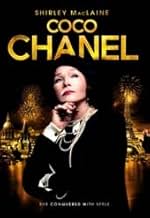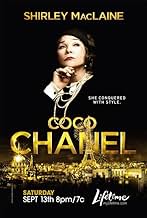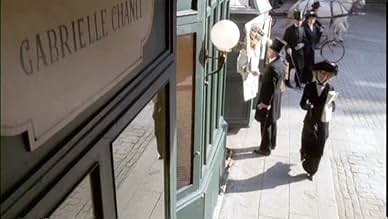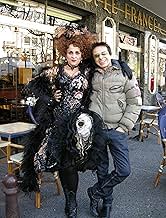IMDb-BEWERTUNG
6,8/10
3952
IHRE BEWERTUNG
Füge eine Handlung in deiner Sprache hinzuThe life story of legendary fashion designer Coco Chanel.The life story of legendary fashion designer Coco Chanel.The life story of legendary fashion designer Coco Chanel.
- Für 2 Primetime Emmys nominiert
- 2 Gewinne & 8 Nominierungen insgesamt
Valeria Cavalli
- Elisabeth Ducrot
- (as Valéria Cavalli)
Empfohlene Bewertungen
Christian Duguay's "Coco Chanel" is a lavishly produced biopic that attempts to trace the iconic designer's rise from humble beginnings to fashion legend. The film boasts impressive period detail, with exquisite costumes and sets that transport the viewer to early 20th-century France. Shirley MacLaine delivers a compelling performance as the older Chanel, embodying the designer's steely resolve and sharp wit. However, beneath its stylish exterior, the film offers a surprisingly superficial portrayal of its complex subject.
The narrative, while chronologically following Chanel's life, often feels like a series of disconnected vignettes rather than a cohesive story. Key relationships and pivotal moments are touched upon but rarely explored with the depth they deserve. The film struggles to truly delve into Chanel's motivations, her revolutionary vision, or the darker aspects of her later life. It's a film that prioritizes aesthetic over insight, leaving the audience with a beautiful but ultimately hollow portrait of a groundbreaking figure.
Is it worth watching? Yes, if you're interested in fashion history and appreciate strong production design, but don't expect a deep character study.
The narrative, while chronologically following Chanel's life, often feels like a series of disconnected vignettes rather than a cohesive story. Key relationships and pivotal moments are touched upon but rarely explored with the depth they deserve. The film struggles to truly delve into Chanel's motivations, her revolutionary vision, or the darker aspects of her later life. It's a film that prioritizes aesthetic over insight, leaving the audience with a beautiful but ultimately hollow portrait of a groundbreaking figure.
Is it worth watching? Yes, if you're interested in fashion history and appreciate strong production design, but don't expect a deep character study.
A biographic film basically loyal to the true history of the pioneering French fashion designer who created the word " Haute Couture" and spread the spiritual Chanel Numero 5 to the whole world is bound to be arresting to movie lovers no matter they are fond of pursuing vogue in beau monde. And the truth is that it's inspiring and engaging. For one thing, Coco Chanel gave women a sense of freedom; gave them back their bodies that were drenched in sweat due to fashion's finery, lace, corsets, underclothes and padding. For another, she insists on woman's independence which may be achieved via true career. Also the two actresses gave the excellent rendition of this legendary woman.
Shirley Maclaine is wonderful as the late older version of Coco Chanel who sets out again to prove her art as one of the finest fashion designers of ladies' fashions and perfume in the world. Barbara Borovona is also wonderful as the younger version of Coco Chanel who rises despite tragedy, hardship, and success. In this film, there are flashbacks and wonderfully done to show Coco's rise from a seamstress assistant to her own visionary. Malcolm McDowell (he deserves knighthood or something) is fine as Coco's business partner. I don't recall the names of the other cast members but they were all fine. I could see why Coco Chanel succeeded even in a male dominated business field at the time of ladies' fashion. Coco understood women being one herself and how clothes should be expressed and comfortable as well. It should be the men who get to be comfortable, women should be too.
If you want to travel to another era and get a full introduction to the world of fashion, here's a great way to do it.
Even if it is a melodrama, it's so well made, with such obsession with detail, refinement, (as Chanel's works, by the way) that you can't but fall for Coco's challenges. And yet it doesn't shy away from her daily struggles. As a business student, I couldn't help noticing how often she was verging on bankruptcy, and how she came out of it with a mixture of audacity, being at the right places and yes, bedding rich gentlemen "above her station" as a Victorian would put it.
Music is fine, as is of course, wardrobe and photography. Being from Argentina, I found a happy curiosity that there are a couple of tangos and Argentina is mentioned twice, as a "land of hope". The first company mentioned on the titles that produced this film is called "Pampa", I suppose it must have something to do with it.
Barbora Bobulova is stunning as young Cocó. Probably more likable besides more beautiful than Audrieu Tatou, with which obviously one is drawn to compare it all the time. Both are fine, probably "Cocó avant Chanel" emphasizes the sad and grim aspects more, whereas this version, being longer, can indulge into more romance and yet show us, for instance, what happened to her beloved sister, something absent from the feature film. Also in this version we see the origin of the famous perfume N 5 and her famous "little black dress". Étienne Balsan and Boy Capel are totally different in both films. So much they almost look like if one of the two films got it all wrong. Étienne in particular is always amiable and respectful to Cocó here, whereas on "avant Chanel" Poelvoorde makes a perfect "good for nothing spoilt boy who never grew up". Boy is also given much more screen time and importance here. Emilienne d'Alencon is barely shown here, and the game of differences could go on and on. I suppose purists and people who really know the real story will love one story and hate the other. But for us newbies both are surprisingly enjoyable. I understand Mc Laine got all the prizes but in my opinion Boulova should have got them.
My "favourite little moment" is how the beautiful countess who lost everything becomes her shrewd "royal secretary", even suggesting her it'd be advantageous for Cocó for "everybody loves nobility. Specially in a republic". I suppose it's a worthy lesson on how money matters are fleeting indeed. I could only wonder, if this is a TV series, what would they have made were they given the ample resources of a feature film...
Even if it is a melodrama, it's so well made, with such obsession with detail, refinement, (as Chanel's works, by the way) that you can't but fall for Coco's challenges. And yet it doesn't shy away from her daily struggles. As a business student, I couldn't help noticing how often she was verging on bankruptcy, and how she came out of it with a mixture of audacity, being at the right places and yes, bedding rich gentlemen "above her station" as a Victorian would put it.
Music is fine, as is of course, wardrobe and photography. Being from Argentina, I found a happy curiosity that there are a couple of tangos and Argentina is mentioned twice, as a "land of hope". The first company mentioned on the titles that produced this film is called "Pampa", I suppose it must have something to do with it.
Barbora Bobulova is stunning as young Cocó. Probably more likable besides more beautiful than Audrieu Tatou, with which obviously one is drawn to compare it all the time. Both are fine, probably "Cocó avant Chanel" emphasizes the sad and grim aspects more, whereas this version, being longer, can indulge into more romance and yet show us, for instance, what happened to her beloved sister, something absent from the feature film. Also in this version we see the origin of the famous perfume N 5 and her famous "little black dress". Étienne Balsan and Boy Capel are totally different in both films. So much they almost look like if one of the two films got it all wrong. Étienne in particular is always amiable and respectful to Cocó here, whereas on "avant Chanel" Poelvoorde makes a perfect "good for nothing spoilt boy who never grew up". Boy is also given much more screen time and importance here. Emilienne d'Alencon is barely shown here, and the game of differences could go on and on. I suppose purists and people who really know the real story will love one story and hate the other. But for us newbies both are surprisingly enjoyable. I understand Mc Laine got all the prizes but in my opinion Boulova should have got them.
My "favourite little moment" is how the beautiful countess who lost everything becomes her shrewd "royal secretary", even suggesting her it'd be advantageous for Cocó for "everybody loves nobility. Specially in a republic". I suppose it's a worthy lesson on how money matters are fleeting indeed. I could only wonder, if this is a TV series, what would they have made were they given the ample resources of a feature film...
I was enjoying the first half of the movie, but it started to drag by hour 2 with still some time on the clock...but it was a made-for-TV movie, so...
The younger Chanel was great, but Shirley MacClaine was a horrible choice for the older Coco. She may be a great actress but cannot pull off being a Frenchwoman! I cringed whenever she opened her mouth.
Finally, after the movie I did some research about the real Coco and the movie totally glossed over her antisemitism, homophobia, and pro-Nazism. It is hard for me to think of her as icon after learning that. Of course, the irony is that Chanel is now headed by two Jewish men whom she previously derided.
The younger Chanel was great, but Shirley MacClaine was a horrible choice for the older Coco. She may be a great actress but cannot pull off being a Frenchwoman! I cringed whenever she opened her mouth.
Finally, after the movie I did some research about the real Coco and the movie totally glossed over her antisemitism, homophobia, and pro-Nazism. It is hard for me to think of her as icon after learning that. Of course, the irony is that Chanel is now headed by two Jewish men whom she previously derided.
Wusstest du schon
- WissenswertesDaria Baykalova's debut.
- PatzerIn Deauville, the newspaper headline announcing the outbreak of the war incorrectly states, "Archduke Francis Joseph" had been assassinated in Sarajevo. Francis (Franz) Joseph was the reigning Austrian emperor and was most certainly not assassinated. His nephew and heir to the empire, Francis (Franz) Ferdinand was assassinated.
- VerbindungenFeatured in 15th Annual Screen Actors Guild Awards (2009)
Top-Auswahl
Melde dich zum Bewerten an und greife auf die Watchlist für personalisierte Empfehlungen zu.
Details
Zu dieser Seite beitragen
Bearbeitung vorschlagen oder fehlenden Inhalt hinzufügen
































